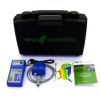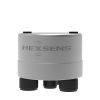Eno Scientific Well Watch 670 Water Level Monitor
Features
- Built-in display allows for view of real-time data and control of settings
- Data logger stores up to 25 million time/date stamped log points
- SCADA & telemetry compatible
- Free ground shipping
- Expedited repair and warranty service
- Lifetime technical support
- More
Overview
The Eno Scientific Well Watch 670 is a line of sonic water level meters designed for semi-permanent installation. These units utilize sound waves and adaptive sensor technology to learn the makeup of a particular well allowing for the most accurate readings. The Well Watch meters were designed to be a solution for the long term monitoring needs of agricultural, municipal, environmental or production well owner/operators.
Design
The Well Watch 670 includes a built-in display with keypad which allows the user to view real time data and to easily control the internal settings. It also has a built-in data logger capable of logging up to 25 million time/date stamped data points. This is the perfect tool to monitor and trend water levels and usage. Utilize this data to prevent over use of a well and save a potential costly repair from a burned up pump.
Installation
These units are easy to install in virtually any well setup. Each Well Watch unit comes with 3 MPT threaded nozzles, 1/2", 3/4" and 1" in diameter. Simply choose the nozzle which fits into the vent hole on the well seal and screw the Well Watch tightly in place. Attachments can be used to angle the units for tight fitting spaces since the Well Watch does not need to be vertical to get a good reading. Then, choose from the multiple output options available to work with the chosen application, including RS232, RS485 (Modbus), 4-20mA, 0-5V Analog, and USB. These are a perfect for monitoring remote wells or as a back up in case of a SCADA system crash.
- Well Watch
- 3 Nozzles (1/2", 3/4", 1")
- Microphone extension tube
- A/C Power adapter
In The News
Wave Sensors Integration with NexSens Buoys: A Cutting-Edge Solution for Wave Measurment
Real-time wave data supports accurate weather prediction, safe and efficient maritime operations, and provides valuable safety and operating condition information for recreation and commercial fishing. Understanding wave dynamics also helps with the design of protective coastal structures like seawalls, breakwaters, and jetties. It also supports better prediction of their impact on sediment transport and coastal geomorphology. Wave data is a key factor in qualifying and designing offshore wind farms and harnessing kinetic energy for electrical generation. It helps with the understanding of ocean-atmosphere interactions and contributes to studies of sea-level rise and climate change impacts.
Read MoreSpring 2025 Environmental Monitor Available Now
In the Spring 2025 edition of the Environmental Monitor, we highlight partnerships across the world and the importance of collaboration between government agencies, universities, environmental groups, local communities, and other stakeholders. From great white shark research in Cape Cod to monitoring fisheries in Lake Erie, this latest edition underscores partnerships that connect stakeholders in a watershed through environmental data. With an emphasis on data sharing, a combination of real-time and discrete sampling keeps the public and partners informed of environmental conditions. Our writers also sought out science professionals dedicated to working with peers within and outside of the environmental sector.
Read MoreMonitoring Mariculture in the Gulf of Alaska
The mariculture industry in the Gulf of Alaska has been steadily growing in recent years, guided by ongoing research to help refine farm location and cultivation practices. A subset of aquaculture, mariculture focuses on rearing organisms in the open ocean. In Alaska, finfish farming is illegal, so most farms cultivate kelp, oysters, or a combination of the two. These small, locally operated farms started popping up in the Gulf of Alaska in the early 1990s, when shellfish farming first became legal. Kelp farming did not begin to catch on in the state until 2016. Many of the coastal areas that have grown interested in mariculture are historically commercial fishing communities.
Read More


















